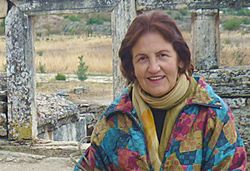If there are desks, blackboards and textbooks, it's not Montessori
|
|
|
Lisa Carducci is a freelance writer based in Beijing. |
An article recently published on China Daily about Montessori schools in China led me to write the following considerations.
Ten years ago, a Chinese friend told me his daughter was attending pre-school class at a Montessori school, his eyes inviting me to show approbation and admiration. I was very surprised, since they lived in a disadvantaged region of northwestern China. The little girl had the bad habit to shout her lungs out anytime she spoke, laugh loudly, listen to TV at high volume, slam the doors, etc. She was the absolute contrary of a child modeled by Montessori's theory. I asked the father what he knew about Montessori's philosophy of education; he said that the children "not only learned academic subjects in class but had some time to play freely."
Maria Montessori, born in 1870 in the Italian province of Ancona, became one of the first women doctors in Italy. She worked at a psychiatric clinic, and later, as the director of a school for mentally-disabled children, she observed the children and developed a method which, in two years, brought them to the level of normal children. Encouraged by such success, Dr. Montessori wondered what children with normal potential could do. She returned to school to study anthropology and psychology, and in 1907, was given charge of 50 children from the shanty San Lorenzo district of Rome.
Her theory is based on the spirit of work and peace. She believes that children educate themselves though their work – which is "play". About the principle of independence, Montessori said: "Never help a child with a task he feels he can perform." Teachers, in Montessori classes, don't teach; they guide. Children are the masters; teachers, their servants. Guiding a child means observing and following him. Teachers spend hours only watching children and see how they enjoy themselves and how they explore their environment. When observing the children, they discover how to help them to develop and where they need to be challenged. The aim of "children at work" (playing) is certainly not to learn, but they learn, and often more rapidly than those who are taught language, calculation, art and science the standard way.
"All kinds of learning – musical, bodily-kinesthetic, spatial, interpersonal, intrapersonal, intuitive, natural, and the traditional linguistic and logical-mathematical – are nurtured and respected," said a web source. Children are not taught; they learn independently.
 0
0 







